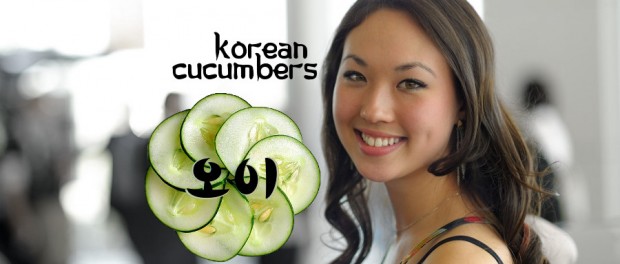Korean Cucumbers — Rejecting the Unique Beauty in Us All

I have long been frustrated by how marketers are able to foster a cruel, seemingly counterintuitive combination of vanity and self-loathing that sells products. I hate it less because of the manipulation it represents and more because of its byproduct: a culture that wants to be what it is not and could not be. As much as I hate it, on some level I’ve become numb to it. However, the other day I witnessed something that gave me new insight into the depths of this evil. And of all places, I encountered this in the waiting room as my oil was being changed.
Beauty Tips from Around the World
Like many such waiting rooms, this one was equipped with a television playing short clips from various daytime TV shows interspersed with informative videos about oil viscosity and spark plugs. One particular morning show clip contained a segment about how to acquire the beautiful aspects of various ethnicities from around the world.
The presented praised one attractive characteristic after another and then offered that country’s local homeopathic secret to looking like they do. The examples came from Asia, South America, and the Pacific Islands. I remember one specific example: Koreans are known for their beautiful, smooth, fair skin, which is accessible to non-Koreans such as myself if I apply cucumber slices to my face daily or some such.
Disturbing Perspective
Stop and think about the sheer audacity of this segment and the disgusting mindset it represents. It makes some startling assumptions that build upon each other:
- the audience knows it is not beautiful
- the audience believes someone else is
- the audience wishes they looked more like someone else than themselves
- the audience hates themselves enough to wish they could look like someone from another ethnicity (Anyone will do, so long as it’s not me.)
- the audience thinks they can look like another ethnicity
This, presumably, is true regardless of what ethnicity the audience comes from. I don’t know which assumption is more disturbing: that I so predictably hate how I look or that I’m dumb enough to think slapping myself in the face with a fruit (yes, cucumbers are fruit) will make me look Korean.
These assumptions, under the homeopathic/health guise, promote psychological unhealth. Discontent repeated enough times produces desperation and an incapacity for self-sufficiency.
Dangerous Territory
At the end of the day, we must learn to be comfortable in our own skin. Let me just tell you something now:
You are beautiful.
Wait a second. Isn’t that a little presumptuous, too? I mean, you, the reader, could be 102 years old. Or overweight. Or a recent amputee. Or (shudder) a man. How can I say you’re beautiful without knowing you? Well, allow me to answer that question with two of my own.
First, how can someone say you’re not beautiful without knowing you?
It’s disturbing that we accept this without question. Every time we watch a commercial or read celebrity gossip, we have an opportunity to internalize someone else’s value judgment on us.
You’re not good enough if you don’t use this hand cream.
So-and-so is gorgeous. You want to look like that.
When the you becomes me in those statements, we’ve accepted as truth someone else saying we’re not good enough, sight unseen.
Taken a step further, though, who says that beauty is skin deep? I love my wife, and I’m intensely attracted to her sexy body. Yet for all her physical sensuality, it’s only the tip of her beautiful iceberg. On our first date, she was beautiful. On our tenth anniversary, she was moreso. Why? It wasn’t because I’d seen more of her body (though obviously I had); it was because I knew her. The more I knew her, the more beautiful she was.
Second, how can someone deny the beauty of God?
Woah. So I do have something spiritual to say? Of course. This isn’t just a rant about the vanity of modern media; psychological health goes hand-in-hand with spiritual health.
We are all made in the image of God. And that Origin of beauty wasn’t content to just cookie cutter Himself. He also Authored beauty, giving each of His images something unique. How dare anyone cast aspersions on His workmanship?
The Eye of the Beholder
In the same way as He authored a unique beauty in each of us, He also authored a unique desire in each of us.
You can look at Michelangelo’s statue of David and say, “Eh, it’s nice but not for me.” But only a fool would suggest there is no beauty to be found by anyone.
You can say, “I don’t care for Corvettes.” Yet you can’t argue with such a large middle-aged male population.
You can describe the perpetual rain of the northwest United States as dreary; however, many there might suggest a beauty in rolling clouds, glimmering rainbows, and the smell of fresh rain.
The point is that each of us has a beauty (admittedly women more than men) endowed by our Creator, and each of us has tastes that are just as one-of-a-kind.
Thinking oneself inherently beautiful is not vanity. Thinking one’s inherent beauty insufficient is vanity.
Originally posted 2015-10-26 08:00:25.


Leave a Reply